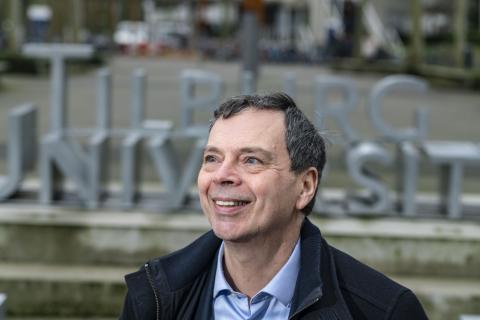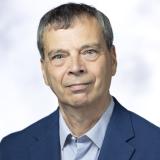John Einmahl: professor of the exceptional
Today, professor John Einmahl says farewell to Tilburg University. As a mathematician on a campus populated by economists, lawyers, psychologists and sociologists, he has spent decades researching what is known as extreme value theory: the mathematics of the exceptional.
Written by Laura van Gelder | Photography by Bram Belloni
Growing up, university was not an obvious route for John Einmahl. “Except for a cousin, no one from my family had gone to university. I lived in a small village in South Limburg and had seen very little of the world, but I was eager to study,” he explains. His teachers recognized his talent for the exact sciences and gave him the last nudge of encouragement to apply for university. There, Einmahl would go on to become an important mathematician and an acclaimed expert in the field of non-parametric statistics, in particular the so-called extreme value theory.
In his office on the campus of Tilburg University, where he has spent much of his career, Einmahl’s desk is scattered with beautifully-bound journals and piles of printed-out scientific papers. After decades of research, this is the impressive academic opus of the valedictory professor: around 100 articles, many of which were published in leading journals and all of which consist of complex formulae and countless pages of mathematical arguments and proofs.
Some of Einmahl’s studies have even made international headlines, such as his calculations of the maximum age people can reach (we will not get much older than 120) or the fastest possible time for the 100 meter sprint (9.36 seconds, slightly faster than the current world record). “I’ve had quite a few hits,” he admits with a smile.
Is that the research you’re most proud of?
“I wouldn’t say that. People find it interesting to know how fast the fastest human can run or what the longest possible lifespan is, and of course it’s great to have your work read by more people than fellow experts and colleagues. But, no, those studies are not my most important work. They contain relatively little new mathematics."

Formulating and proving new mathematical theorems is what I spend most of my time on, and what I enjoy most
John Einmahl
New mathematics, what does that mean?
"In probability theory and statistics, which is what a lot of my work focuses on, you often take existing data as your starting point and you go from there. But you can also conduct mathematical research in a theoretical way, without using data. That’s what I mean by new mathematics: formulating and proving new mathematical theorems.
When you try to prove a theorem, there are a lot of conditions that must be met. It’s like a very complex puzzle that you’re trying to crack. You keep trying and failing and trying and failing, and you start asking yourself why you don’t succeed—is it because you’re just not smart enough, or because the theorem is not true? And so you continue working on it until you finally succeed in proving your theorem. It’s what I spend most of my time doing, and what I enjoy most."
That sounds pretty fundamental. At the same time, your research is also focused on practical issues, such as calculating the risks of natural disasters.
“Yes, within my department, ‘fundamental’ is a word that comes up often in connection to my research. The funny thing is that my work is seen as very fundamental and theoretical here at the university and within my department, while it’s regarded as very applied within the mathematical community. I often try to bring theoretical and applied mathematics together, and my research does include both, but I must say that mathematical theory is ultimately where my heart lies.”
Your valedictory address is titled ‘A beautiful theorem needs no application’. You consider it a shame that many people don’t see the beauty of mathematics and are mainly interested in what it’s good for. Why?
“If you’re an art painter, everyone can see the beauty of your work. But for many people, the beauty of mathematics remains invisible. The Dutch mathematician Lex Schrijver once compared mathematics to oxygen: it’s all around you and you cannot do without it, but you don’t see it or notice how much you rely on it for everything you do.
Mathematics has many important applications, but that doesn't mean that mathematical research always has to be focused on a practical application
Mathematics has many important applications, but that doesn’t necessarily mean that mathematical research always has to be focused on a practical application. To give one example: the mathematical research we do here is used for climate calculations. But I don’t conduct climate research myself. I focus on the mathematics behind it.”
Do you think there’s too little appreciation for the kind of mathematics you focus on, the mathematics behind things?
“I can understand why it’s underappreciated. When you’re at a party and you tell someone you’re mathematician, you often need to explain what it is that you do exactly. But the difficulty is that I can’t really explain what I’m working on, because most people will not understand. That’s obviously not a big issue when you’re at a party, but it does get complicated when you have to convince funding agencies and politicians that you need funding for your research. That’s not easy. In order to get your research financed, you need a story that appeals to others. Economists, for example, often have a very appealing story to tell. But the story I have to tell is impossible for most people to follow, even within my own faculty.”
In that respect, Tilburg University isn't really a place of like-minded people either for a mathematician. There’s no mathematics department here. You’ve spent the last 22 years within the economics faculty. What were those years like for you, as a mathematician among economists?
“I’ve actually experienced it as really positive. Before coming to Tilburg University, I worked in more mathematical environments – first at Radboud University Nijmegen and later at the universities of Maastricht and Eindhoven. In some ways, that is different. Here, I don’t have a central position within the School. But, for me, that's been more of an advantage than a disadvantage. I’ve always been able to spend much of my time on research, without being tasked with all too heavy administrative or teaching duties. And I get to collaborate with colleagues here and at other universities a lot, within the Netherlands and also internationally.”
In extreme value theory, we don't look at averages but at extremes. Instead of calculating the average sea level, we calculate what level the water reaches on the day it goes terribly wrong.
You specialize in extreme value theory. What does that entail?
“Statistics is often about averages. For example, you look at the average temperature or the average income. In extreme value theory, we don’t look at averages, but at extremes. So instead of calculating what the average sea level is, we calculate what level the water reaches on the day that it goes terribly wrong. That’s important, because it enables us to determine how high our dikes need to be to keep the risk of flooding within acceptable limits. And there are lots of situations where the extremes rather than averages are important for managing risks and calculating probabilities.”
You are now saying farewell to Tilburg University. To speak in terms of probability: how likely is it that you will carry on with your research during your retirement?
“Oh, that’s quite certain. There are still many mathematical problems that I want to work on. I’ve always collaborated a lot with Laurens de Haan—he retired as a professor from Erasmus University years ago, and we still conduct research together. The way I look at it, going from professor to professor emeritus is not a discontinuity. It's just a change in the pattern.”
Is a mathematician’s work ever done?
“No, the work will never be finished. If anything, I think it only keeps expanding. Like a tree that slowly grows and continues to branch out into new possibilities.”
-

Prof. dr. John Einmahl
Tilburg School of Economics and ManagementProf. dr. John Einmahl (1957) delivers his valedictory address entitled ‘A beautiful theorem needs no application’ on 8 September 2023, as he bids farewell to Tilburg University. He has spent the last 22 years as a professor in the Department of Econometrics and Operations Research at the Tilburg School of Economics and Management (TiSEM). From 2019 until 2022, he held the Arie Kapteyn Chair, an honorary title awarded to him in recognition of his many high-quality publications and impactful research.
Einmahl studied Mathematics at Radboud University Nijmegen, where he also obtained his PhD in 1986. He worked at Maastricht University and Eindhoven University of Technology before being appointed Professor of Statistics at Tilburg University in 2001.
Note for the press
For more information, please contact professor John Einmahl directly (j.h.j.einmahl@tilburguniversity.edu), or reach out to TiSEM's science communicator Laura van Gelder (l.f.vangelder@tilburguniversity.edu).
